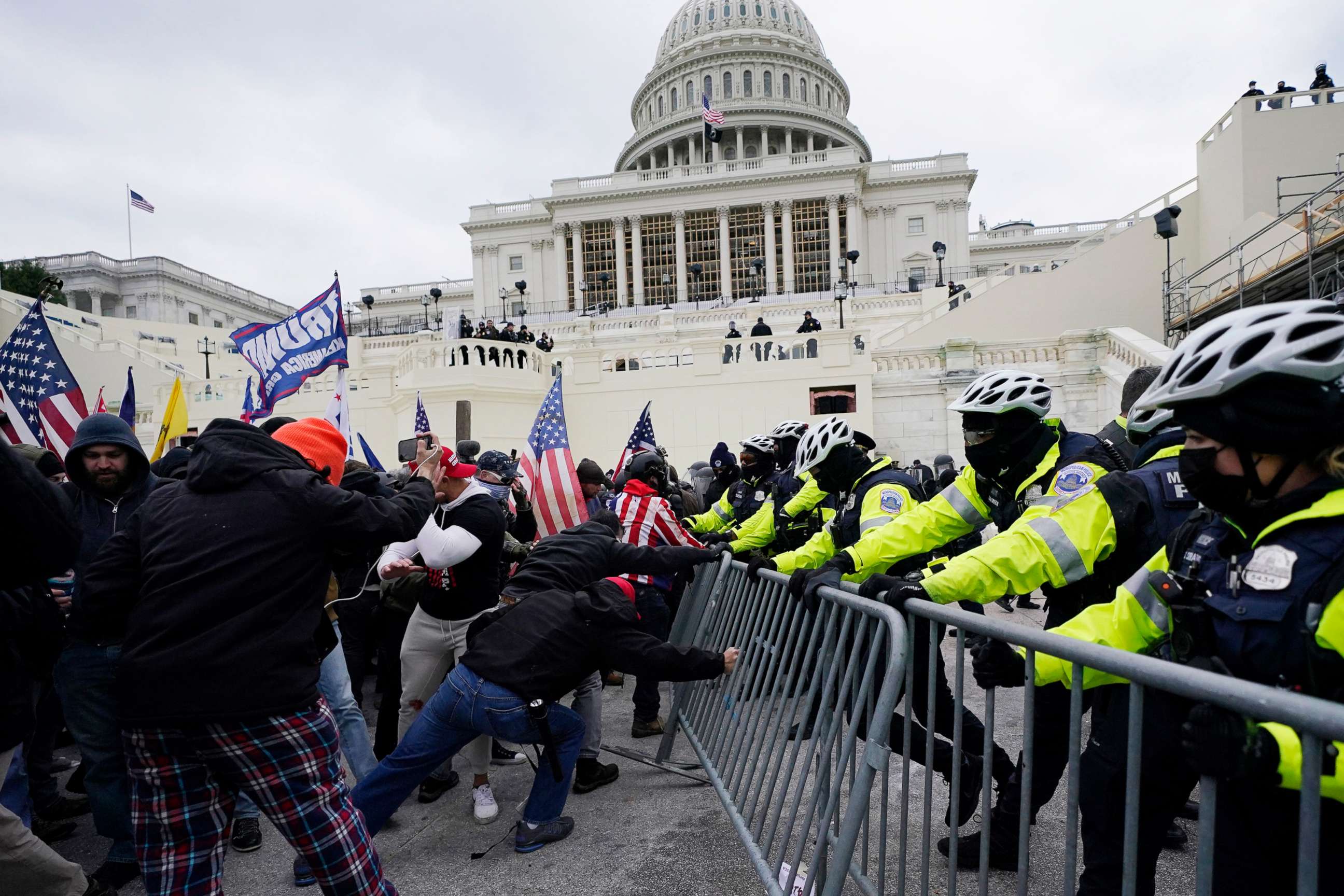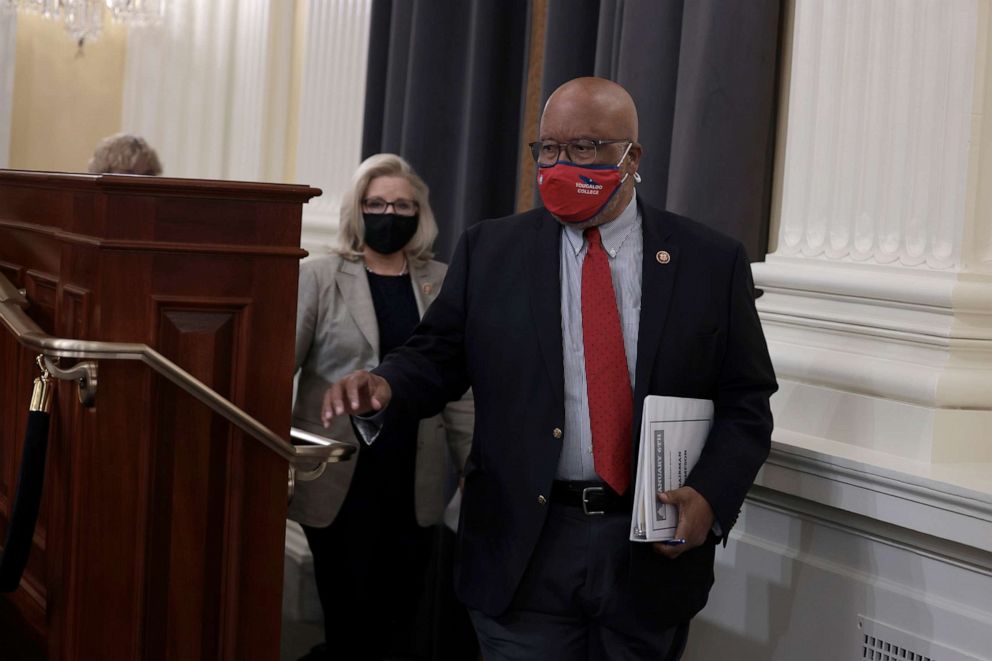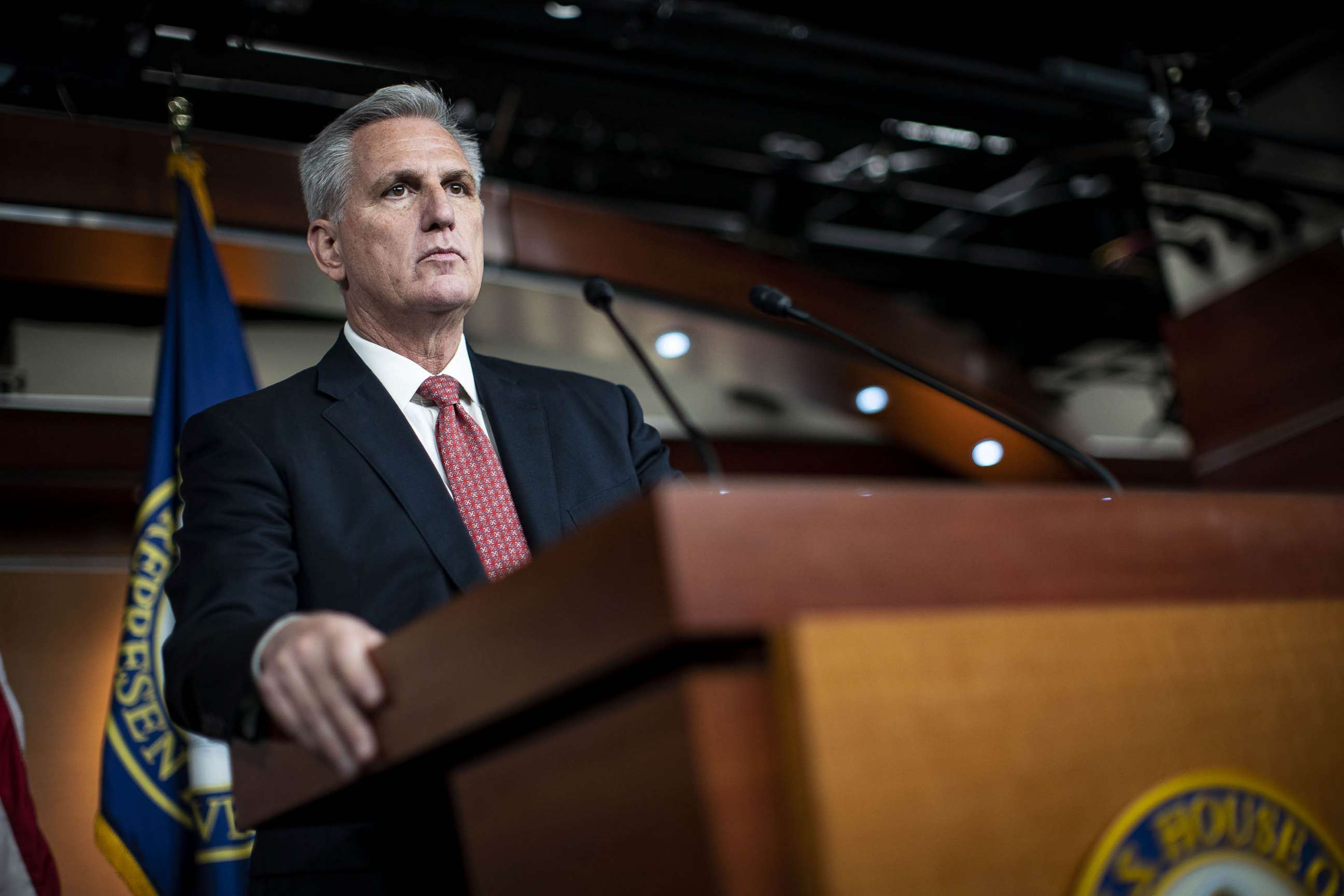GOP Leader Kevin McCarthy says he won't cooperate with Jan. 6 committee
It is not compelling him to provide information or sit before the committee.
GOP Leader Kevin McCarthy says he will not voluntarily cooperate with the House select committee's probe into the Jan. 6 Capitol riot.
"This committee is not conducting a legitimate investigation as Speaker [Nancy] Pelosi took the unprecedented action of rejecting the Republican members I named to serve on the committee. It is not serving any legislative purpose," McCarthy said in a statement Wednesday night. "The committee’s only objective is to attempt to damage its political opponents -- acting like the Democrat Congressional Campaign Committee one day and the DOJ the next."
McCarthy said in the release that his statements and private conversations have already been dispersed in the public domain and that he has "nothing else to add."
In a letter sent earlier in the day, the committee asked him to voluntarily provide information.
It is not compelling him to provide information or sit before the committee at this time.
Chairman Bennie Thompson said in the letter that he believes McCarthy has relevant information that could speak into the facts, circumstances, and causes leading to the Jan. 6, 2021, attack.

Thompson also wants information from McCarthy about events in the days before and after Jan. 6.
"You have acknowledged speaking directly with the former President while the violence was underway on January 6th," Thompson writes.
"The Select Committee wishes to question you regarding communications you may have had with President Trump, President Trump's legal team, Representative Jordan, and others at the time on that topic," Thompson writes.
McCarthy has made multiple statements about Jan. 6 and about his conversations with Trump that day.
ABC News has reached out to McCarthy's office for comment.
He is now the third member of Congress the committee has reached out to for information about the Jan. 6 Capitol attack.
In the last few weeks, GOP Reps. Jim Jordan and Scott Perry were also contacted by the select committee but they denied the requests to sit down for an interview or to provide documents. The panel has not ruled out trying to compel their testimony.

The committee has proposed meeting with McCarthy on Feb. 3 or 4, 2022, with an alternate date the following week if he is unavailable.
"The Select Committee has tremendous respect for the prerogatives of Congress and the privacy of its Members. At the same time, we have a solemn responsibility to investigate fully the facts and circumstances of these events," they write.
Notably, the committee believes McCarthy can speak to Trump's "state of mind" leading up to, during and after the Capitol riot.
Thompson's letter to McCarthy provides several comments previously made by McCarthy, including interviews in which he discussed his conversations with Trump as the violence was ongoing.
"As is readily apparent, all of this information bears directly on President Trump's state of mind during the January 6th attack as the violence was underway," the committee's letter states.
The committee is also seeking information about communications with Trump after Jan. 6, 2021.
"The Select Committee has contemporaneous text messages from multiple witnesses identifying significant concerns following January 6th held by White House staff and the President's supporters regarding President Trump's state of mind and his ongoing conduct. It appears that you had one or more conversations with the President during this period," the letter states.
"It appears that you may also have discussed with President Trump the potential he would face a censure resolution, impeachment, or removal under the 25th Amendment. It also appears that you may have identified other possible options, including President Trump's immediate resignation from office," it adds.
The letter also points to McCarthy's visit to Trump at Mar-a-Lago as a potential read into Trump's state of mind. The meeting took place shortly before the commencement of his impeachment trial in the Senate.
"Despite the many substantial concerns you voiced about President Trump's responsibility for the January 6th attack, you nevertheless visited President Trump in Mar-a-Lago on January 28th (the impeachment trial began on February 9, 2021). While there, you reportedly discussed campaign planning and fundraising to retake the House majority in 2022."
"The Select Committee has no intention of asking you about electoral politics or campaign-related issues, but does wish to discuss any communications you had with President Trump at that time regarding your account of what actually happened on January 6th. Your public statements regarding January 6th have changed markedly since you met with Trump. At that meeting, or at any other time, did President Trump or his representatives discuss or suggest what you should say publicly, during the impeachment trial (if called as a witness), or in any later investigation about your conversations with him on January 6th?"

Former White House press secretary Kayleigh McEnany appeared before the Jan. 6 select committee on Wednesday, a source familiar with the matter confirmed to ABC News.
She sat before the committee virtually, according to the source.
McEnany was subpoenaed in November 2021.
At the time, the committee published a release saying the "former White House Press Secretary, made multiple public statements from the White House and elsewhere about purported fraud in the November 2020 election. For example, in the first White House press conference after the election, Ms. McEnany claimed that there were 'very real claims' of fraud that the former President's reelection campaign was pursuing, and said that mail-in voting was something that 'we have identified as being particularly prone to fraud.' At another press conference, Ms. McEnany accused Democrats of 'welcoming fraud' and 'welcoming illegal voting.' In addition, Ms. McEnany was reportedly present at times with the former President as he watched the January 6th attack."
McEnany was also a spokesperson for Trump's 2020 reelection campaign.
ABC News' Benjamin Siegel contributed to this report.




